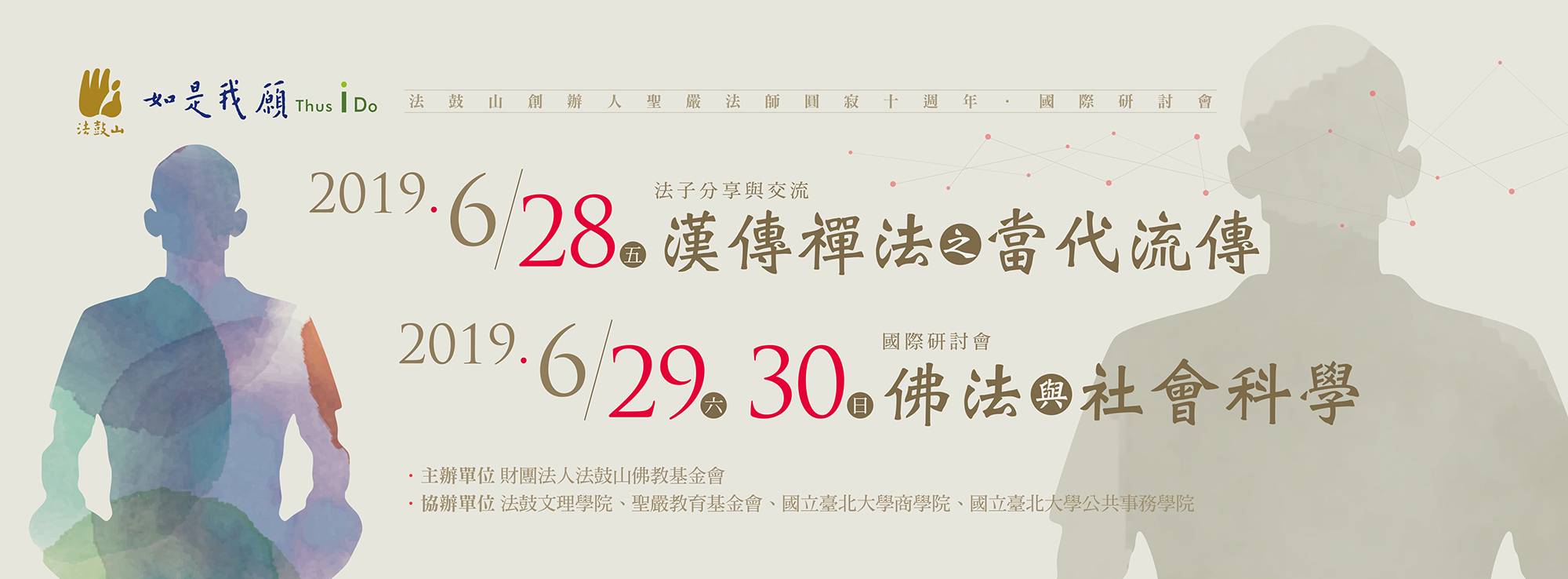漢傳禪法在世間
—法鼓山義工團環保組禪法生活應用課程之發展與調查
張雅雯
本研究旨在發展可導引初學者將漢傳禪法應用於日常生活的課程架構,於法鼓山三大教育環境脈絡下,以法鼓山義工團環保組為切入點,做為禪法生活應用課程之推動參考;課程發展以聖嚴法師禪法為理論依據,按其「理論與實踐並重」、「頓中有次第漸修」、「自我成長四階段」等特色進行課程規劃,以《現代經典系列》、《大法鼓》等對信眾生活應用之開示為課程輸出參考,並以關注情境脈絡、淨化自心、生活實踐做為行動計畫的指導原則,強調理論與實務的研究循環過程,並致力於行動與反思間的緊密連結。本研究採取課程行動研究方案,於2017年12月至2018年12月間,配合法鼓山義工團環保組每月大出坡日期,在環保組幹部「強化禪修練習與分享、落實組織關懷以鼓勵更多人加入義工修福修慧」的共識下,進行「漢傳禪法生活應用—環保組系列」課程的設計與實作,總計六次90至105分鐘之課程 、一次全日總結課程,以環保組義工全員為共同參與者,透過課間討論分享、課後幹部反饋、禪修法師的指導建議,在互動過程中藉由課程設計、教學、反饋、成效檢視、修正的研究歷程,形成螺旋向上動能,發展出「理論課程(影音與故事)」、「實踐課程(手作活動導入)」及「練習課程(課後生活習慣建立)」三大課程架構;以「因果、因緣、識(環境、身、心)、萬法唯心、真空妙有」的理論構面,對應設計實踐導入、練習與成效指標,據以執行研究後提出研究發現、建議與結論。本研究企圖落實教學相長、學生與老師互動的雙徑學習理念,期能透過義工團環保組、法鼓文理學院等參與者對法鼓山內部經驗、教育經驗的關注與理解,以多重意義、多重觀點發展出具有漢傳禪法傳承、符合法鼓山環境脈絡的禪法生活應用課程。
關鍵字:漢傳禪法、生活應用、聖嚴法師、法鼓山義工、課程行動研究
Practicing Chan in Daily Life—A Study of Curriculum Development and Inquiry in Education for Environmental Protection Team of DDM Volunteers
Ya-Wen Chang
This paper focuses on developing curriculums to assist beginners in practicing Chan in daily life. Within the context of Dharma Dram Mountain volunteer group (hereinafter referred as “DDMVG”), a 6-course systematic curriculum was designed and conducted to members of Environmental Protection Team (hereinafter “EPT”) of DDMVG on days of providing volunteer services from December 10, 2017 to October 14, 2018 and a summary curriculum was blended in annual year-end banquet on December 23, 2018 (hereinafter “the curriculums”). The curriculums were developed based on Master Shen-yen’s theoretical and methodical teachings of Chan. Feedbacks form EPT participants within classroom and suggestions from meditation instructor also profoundly contribute to dynamic development of the curriculums. As outcome of a participatory learning process, courses of the curriculums are divided into four sectors: theoretical illustration with stories, methodical practice through experiencing activities, group-based discussion and practice at home. Furthermore, the study investigated the following: (a) participants’ practicing experiences of chan in daily life, if any, after participating the curriculums through open-ended questions in inquiry, and (b) participants’ attitudes regards to conducting curriculums on volunteer-service days or blending in annual banquets through questionnaire. In accordance with observations and analysis of data from inquiries, this paper concludes and suggests as follows: (a) the curriculum can facilitate participants’ practice of chan in daily life, strengthen interactions between participants via group-based discussion and experience sharing within classroom. (b) implanting curriculums on volunteer-service days or blending in annual banquets is potentially a useful method for changing 11% of EPT volunteers who reluctant to practice chan and serving as a vehicle for transforming their learning. This paper generates actionable knowledge within DDMVG context and shares suggestions from interior perspective through EPT. Findings of this paper could be assistance to those whom might be interested in future curriculum developments or teaching innovations in education for DDM volunteers.
